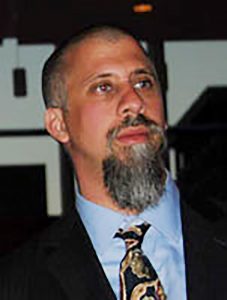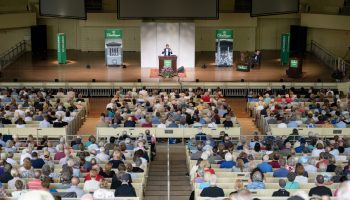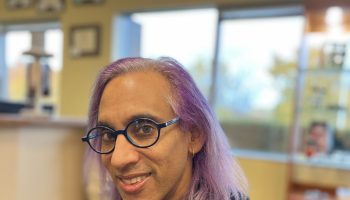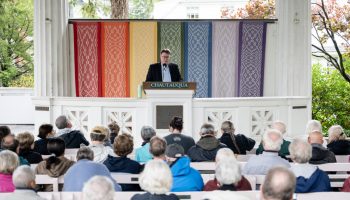Robert Geraci studies magic.
But there are no card tricks or wizards involved in Geraci’s research. Geraci focuses on religion, science and technology — things that are magical to him because they all give meaning to the world.
“It’s that kind of magic: It’s the magic that says, ‘Hey, this world actually is really meaningful and special,’ ” Geraci said. “This world is more than just a place that I’m walking through; it’s better than that. I’m not just a passerby here. This is actually something really fabulous to be a part of.”
At 2 p.m. August 10 in the Hall of Philosophy, Geraci will give a lecture titled “The Enhancement Game: Transcendent Bodies in Digital Worlds.” He will address the transcendence and power people find when they enter “digital worlds” and “video game environments.”
Video game environments give humans powers they never had on Earth. Maybe they can teleport, cast fireballs, operate laser guns or explore the solar system. Maybe they can even die and resurrect themselves.
“That possibility of transcendence is, I think, one of the features that makes games really exciting for people to be a part of,” Geraci said. “That then even bleeds into the religious or philosophical perspective of transhumanism, which is the belief that you can use technology to transcend our ordinary human, mortal limits.”
During his research, Geraci met people who are seriously excited to one day upload their minds into robots and live forever. Geraci said he discovered there’s a small, but growing, community of people who strive to one day actually live in those digital worlds.
“[Those people] believe that you can either transfer or copy your consciousness into [digital worlds], or that your identity in the virtual world might become its own person, that it might separate out from you and live on there,” Geraci said. “[In my lecture], I’m going to talk about those issues: the kind of dual way in which games offer an everyday transcendence, and also the possibility for some people that they offer a radical transcendence.”
Those radical ideas source Geraci’s view of technology as a “magical” tool that’s similar to religion. He views religion as a way of finding meaning and purpose in the world, but technology as a means of looking for meaning by building it into the existing environment.
Geraci’s personal religious history is complicated. He was raised Catholic, yet began researching and exploring other religions as an adolescent. By the time Geraci graduated college, he was non-practicing and agnostic, although the intellectual study of religions still fascinated him.
Geraci converted to Judaism later in life, after years of practicing its traditions with his wife. But although he remains moderately committed to Jewish practice, and is raising his kids Jewish, Geraci remains “deeply agnostic” as far as his beliefs go.
“When I converted, nobody ever asked me if I believed in God, because it’s not exactly pertinent to being Jewish,” Geraci said. “Lots of Jews believe in God but lots of them don’t, and being part of the community is not like Christianity where you can’t be a Christian if you don’t believe in God.”
Geraci said in theology, Christianity is considered an orthodox religion where belief dictates participation, while Judaism is an orthopractic religion where practice dictates participation.
But regardless of his beliefs, Geraci’s Jewish identity is very important to him, especially regarding his commitment to health, helping the suffering and social justice issues.
Geraci contributes to society both religiously and intellectually through his work as a religious scholar, and also in his job as a professor of religious studies at Manhattan College. He said his work as a professor aligns with his own religious sensibilities.
“It’s in part about educating first-generation college students, but it’s in part about making students understand that when they graduate from college, they’re supposed to go out and make the world a better place,” Geraci said. “College isn’t just about them refining the skills with which they’re going to go make money, but it’s also about refining their skills to contribute to the world in a powerful way.”
Geraci’s mission of inspiring his students is magical and meaningful in its own way. Both his work and his research strive to answer the questions: How do we make the world meaningful? How do we take a mundane, ordinary world and make it special?
“The kind of magic that interests me [is] the way in which we talk about [the world], that this is actually kind of a great place to be, and how human beings can flourish in it and even seek transcendence in it,” Geraci said. “That we can be more than what we were, that we can make the world more than it was.”





